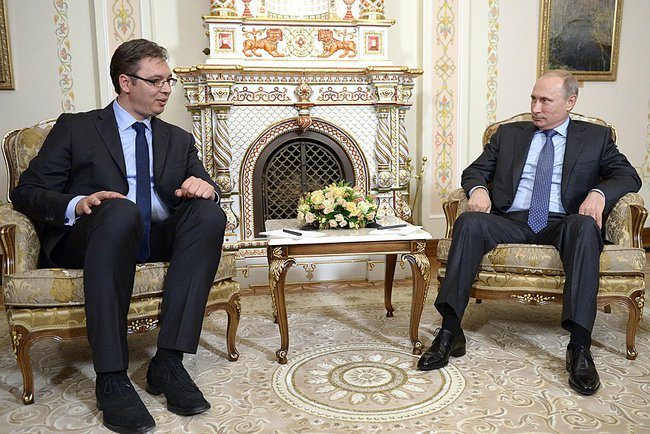 Photo Credit: www.kremlin.ru
Photo Credit: www.kremlin.ru
Two Chairs and One Bad Strategy: US Missteps in Serbia
U.S. Deputy Assistant Secretary for European and Eurasian Affairs Hoyt Brian Yee caused a stir in the Serbian capital of Belgrade on October 23rd that has continued to have repercussions for relations with the key Balkan nation. While speaking at the Serbian Economic Summit, Mr. Yee suggested that Serbia needed to show a stronger desire to join the European Union rather than move closer to Russia. Referring to Serbia’s efforts to try and stay on good terms with the West and Russia simultaneously, he stated that “you cannot sit on two chairs, especially if those chairs are too far apart.” This statement shows a fundamental mishandling by the United States of not only the West’s relationship with Serbia, but of relationships with countries that are undecided or conflicted regarding alignment in the context of ongoing confrontation with Russia.
The Serbian issue is complex. The state is a far cry from the Milosevic era of the 1990s, now pursuing closer ties with the West and accession to the EU. At the same time, there are still rifts between Serbia and its potential partners. Memories of NATO’s 1999 bombing campaign are still fresh for many Serbs, and tensions remain high over Western recognition of the breakaway province of Kosovo. In that vein, Serbian President Alexander Vucic has accused the West of hypocrisy for failing to treat Spain’s Catalonia region the same as Kosovo, and his government has even appointed a convicted war criminal to teach in Serbia’s military academy. Under the leadership of President Vucic’s party, worrying questions have also been raised about political freedom–especially following irregularities in the 2016 parliamentary elections.
Meanwhile, Serbia has a strong relationship with Russia going back generations, which it has sought to reinforce as it encounters roadblocks to Western integration. Russia serves as Serbia’s third largest import partner and fifth largest export partner, has engaged in military exercises with Serbia, and is supplying surplus military equipment to the Serbian military–including the recent gift of several MiG-29 air superiority fighters. But most importantly, Russia has backed Serbia in its continuing claims to Kosovo, refusing to recognize its independence and attacking NATO for destabilizing the Balkans.
With all this in mind, putting Serbia in a position where it is forced to “choose” between the West and Russia is a significant mistake. Though Serbia’s modern relationship with the West has developed quickly, it is still new and fragile compared to its long and enduring ties with Russia that are rooted in economic, cultural, linguistic, and religious connections. While Serbia seems to genuinely want closer ties with the West, it is not immediately prepared or able to forsake Russia in exchange. This is especially true as Serbia continues to encounter various roadblocks to its EU membership that increase the frustration of its people and its politicians with the Western order, and also when pro-Russian sentiment within its own society remains high.
To that end, Russia has already worked to capitalize on Mr. Lee’s statement. Serbian Defense Minister Aleksandar Vulin–a pro-Russian member of Mr. Vucic’s government–immediately came out against US “pressure” on Serbia. He was later joined by Foreign Minister Ivica Dacic, who defended his country’s effort to balance between East and West. Russian media have seized the opportunity as well, with Kremlin-supported Sputnik news agency referring to Yee’s statement as “blackmail.” Russian state-run news service TASS also characterized Mr. Yee’s statements as an attack on Serbia’s efforts to establish good relations with both the West and Russia rather than abandon Russia for the West.
While the United States faces a period of confrontation with Russia it has not experienced since the Cold War, policymakers must understand that putting borderline states on the spot regarding allegiances is a losing strategy. Even if this strategy does succeed in gaining an ally or partner, it gives ammunition to Russia to accuse the United States of further seeking to divide the world and the threaten the peace. More likely–if the situations in other borderline states are misunderstood as Serbia’s–it will only aggravate internal political divisions within that state, either pushing it closer towards Russia or driving it into a potentially disastrous internal crisis. Making new allies and partners must be centered around the attraction of Western ideas and the opportunities of its system, which is a process of “soft power” that often takes time. Trying to prematurely force a decision through veiled threats will only undermine the very principles of the community that nations like Serbia are considering joining.





